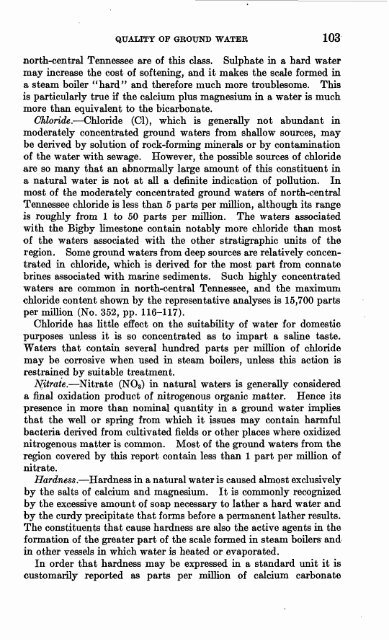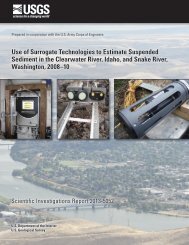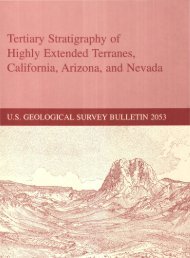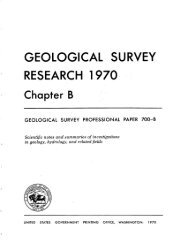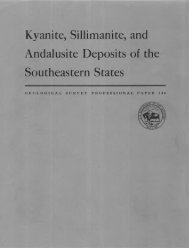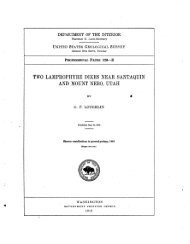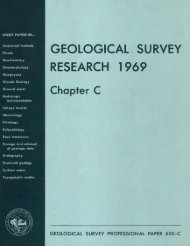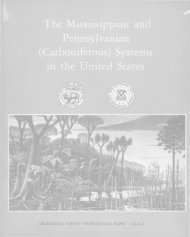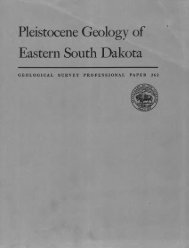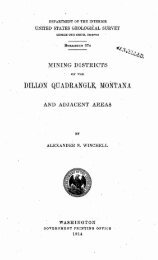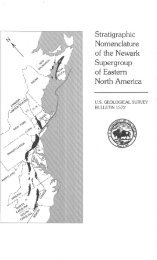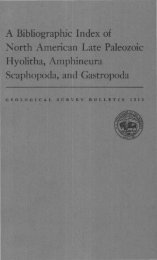GROUND WATER IN NORTH-CENTRAL TENNESSEE
GROUND WATER IN NORTH-CENTRAL TENNESSEE
GROUND WATER IN NORTH-CENTRAL TENNESSEE
Create successful ePaper yourself
Turn your PDF publications into a flip-book with our unique Google optimized e-Paper software.
QUALIFY OF <strong>GROUND</strong> <strong>WATER</strong> 103<br />
north-central Tennessee are of this class. Sulphate in a hard water<br />
may increase the cost of softening, and it makes the scale formed in<br />
a steam boiler "hard" and therefore much more troublesome. This<br />
is particularly true if the calcium plus magnesium in a water is much<br />
more than equivalent to the bicarbonate.<br />
Chloride. Chloride (Cl), which is generally not abundant in<br />
moderately concentrated ground waters from shallow sources, may<br />
be derived by solution of rock-forming minerals or by contamination<br />
of the water with sewage. However, the possible sources of chloride<br />
are so many that an abnormally large amount of this constituent in<br />
a natural water is not at all a definite indication of pollution. In<br />
most of the moderately concentrated ground waters of north-central<br />
Tennessee chloride is less than 5 parts per million, although its range<br />
is roughly from 1 to 50 parts per million. The waters associated<br />
with the Bigby limestone contain notably more chloride than most<br />
of the waters associated with the other stratigraphic units of the<br />
region. Some ground waters from deep sources are relatively concen<br />
trated in chloride, which is derived for the most part from connate<br />
brines associated with marine sediments. Such highly concentrated<br />
waters are common in north-central Tennessee, and the maximum<br />
chloride content shown by the representative analyses is 15,700 parts<br />
per million (No. 352, pp. 116-117).<br />
Chloride has little effect on the suitability of water for domestic<br />
purposes unless it is so concentrated as to impart a saline taste.<br />
Waters that contain several hundred parts per million of chloride<br />
may be corrosive when used in steam boilers, unless this action is<br />
restrained by suitable treatment.<br />
Nitrate. Nitrate (NO3) in natural waters is generally considered<br />
a final oxidation product of nitrogenous organic matter. Hence its<br />
presence in more than nominal quantity in a ground water implies<br />
that the well or spring from which it issues may contain harmful<br />
bacteria derived from cultivated fields or other places where oxidized<br />
nitrogenous matter is common. Most of the ground waters from the<br />
region covered by this report contain less than 1 part per million of<br />
nitrate.<br />
Hardness. Hardness in a natural water is caused almost exclusively<br />
by the salts of calcium and magnesium. It is commonly recognized<br />
by the excessive amount of soap necessary to lather a hard water and<br />
by the curdy precipitate that forms before a permanent lather results.<br />
The constituents that cause hardness are also the active agents in the<br />
formation of the greater part of the scale formed in steam boilers and<br />
in other vessels in which water is heated or evaporated.<br />
In order that hardness may be expressed in a standard unit it is<br />
customarily reported as parts per million of calcium carbonate


